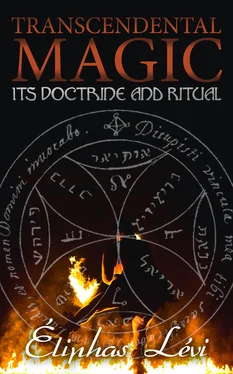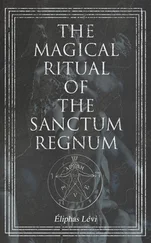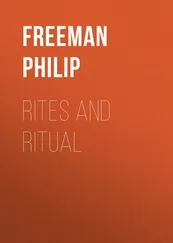 TAU. – Let us add to these three septenaries that the wise man rules the elements, stills tempests, cures the diseased by his touch and raises the dead!
TAU. – Let us add to these three septenaries that the wise man rules the elements, stills tempests, cures the diseased by his touch and raises the dead!
But certain things have been sealed by Solomon with his triple seal. It is enough that the initiates know; as for others, whether they deride, doubt or believe, whether they threaten or fear, what matters it to science or to us?”
Such actually are the issues of occult philosophy, and we are in a position to meet the charge of insanity or the suspicion of imposture when we affirm that these privileges are real. To demonstrate this is the sole end of our work on occult philosophy. The Philosophical Stone, the Universal Medicine, the transmutation of metals, the quadrature of the circle and the secret of perpetual motion are neither mystifications of science nor dreams of delusion. They are terms which must be understood in their proper sense; they formulate the varied applications of one and the same secret, the several aspects of a single operation, which is defined in a more comprehensive manner under the name of the Great Work. Furthermore, there exists in Nature a force which is immeasurably more powerful than steam, and a single man, who is able to adapt and direct it, might change thereby the face of the whole world. This force was known to the ancients; it consists in a Universal Agent having equilibrium for its supreme law, while its direction is concerned immediately with the Great Arcanum of Transcendental Magic. By the direction of this agent it is possible to modify the very order of the seasons; to produce at night the phenomena of day; to correspond instantaneously between one extremity of the earth and the other; to see, like Apollonius, what is taking place on the other side of the world; to heal or injure at a distance; to give speech a universal success and reverberation. This agent, which barely manifests under the uncertain methods of Mesmer's followers, is precisely that which the adepts of the Middle Ages denominated the First Matter of the Great Work. The Gnostics represented it as the fiery body of the Holy Spirit; it was the object of adoration in the Secret Rites of the Sabbath and the Temple, under the hieroglyphic figure of Baphomet or the Androgyne of Mendes. All this will be proved.
Here then are the secrets of occult philosophy, and such is Magic in history. Let us glance at it now as it appears in its books and its acts, in its Initiations and its Rites. The key of all magical allegories is found in the tablets which we have mentioned, and these tablets we regard as the work of Hermes. About this book, which may be called the keystone of the whole edifice of occult science, are grouped innumerable legends that are either its partial translation or its commentary reproduced perpetually, under a thousand varied forms. Sometimes the ingenious fables combine harmoniously into a great epic which characterizes an epoch, though how or why is not clear to the uninitiated. Thus, the fabulous history of the Golden Fleece resumes and also veils the Hermetic and magical doctrines of Orpheus; and if we recur only to the mysterious poetry of Greece, it is because the sanctuaries of Egypt and India to some extent dismay us by their resources, leaving our choice embarrassed in the midst of such abundant wealth.
We are eager, moreover, to reach the Thebaid at once, that dread synthesis of all doctrine, past, present and future; that – so to speak – infinite fable, which reaches, like the Deity of Orpheus, to either end of the cycle of human life.
Extraordinary fact! The seven gates of Thebes, attacked and defended by seven chiefs who have sworn upon the blood of victims, possess the same significance as the seven seals of the Sacred Book interpreted by seven genii and assailed by a monster with seven heads, after being opened by a Lamb which liveth and was dead, in the allegorical work of St. John. The mysterious origin of Oedipus, found hanging on the tree of Cithaeron like a bleeding fruit, recalls the symbols of Moses and the narratives of Genesis. He makes war upon his father, whom he slays without knowing – tremendous prophecy of the blind emancipation of reason apart from science. Thereafter he meets with the sphinx, that symbol of symbols, the eternal enigma of the vulgar, the granite pedestal of the sciences of the sages, the voracious and silent monster whose unchanging form expresses the one dogma of the Great Universal Mystery. How is the tetrad changed into the duad and explained by the triad? In more common but more emblematic terms, what is that animal which in the morning has four feet, two at noon, and three in the evening? Philosophically speaking, how does the doctrine of elementary forces produce the dualism of Zoroaster, while it is summarized by the triad of Pythagoras and Plato? What is the ultimate reason of allegories and numbers, the final message of all symbolisms? Oedipus replies with a simple and terrible word which destroys the sphinx and makes the diviner King of Thebes: the answer to the enigma is MAN! . . . Unfortunate! He has seen too much, and yet through a clouded glass. A little while and he will expiate his ominous and imperfect clairvoyance by a voluntary blindness, and then vanish in the midst of a storm, like all civilizations which – each in its own day – shall divine an answer to the riddle of the sphinx without grasping its whole import and mystery. Everything is symbolical and transcendental in this titanic epic of human destinies. The two antagonistic brothers formulate the second part of the Grand Mystery, completed divinely by the sacrifice of Antigone. There follows the last war; the brethren slay one another; Capaneus is destroyed by the lightning which he defies; Amphiaraus is swallowed by the earth; and all these are so many allegories which, by their truth and their grandeur, astonish those who can penetrate their triple hieratic sense. Aeschylus, annotated by Ballanche, gives only a weak notion concerning them, whatever the primeval sublimities of the Greek poet or the ingenuities of the French critic.
The secret book of antique initiation was not unknown to Homer, who outlines its plan and chief figures on the shield of Achilles, with minute precision. But the gracious Homeric fictions replaced too soon in popular memory the simple and abstract truths of primeval revelation. Humanity clung to the form and allowed the idea to be forgotten; signs lost power in their multiplication; Magic became corrupted also at this period, and degenerated with the sorcerers of Thessaly into the most profane enchantments. The crime of Oedipus brought forth its deadly fruits, and the science of good and evil erected evil into a sacrilegious divinity.
Men, weary of the light, took refuge in the shadow of bodily substance; the dream of that void which is filled by God seemed in their eyes to be greater than God Himself, and thus hell was created.
When, in the course of this work, we make use of the consecrated terms God, Heaven and Hell, let it be understood, once and for all, that our meaning is as far removed from that which the profane attach to them as initiation is remote from vulgar thought. God, for us, is the AZOT of the sages, the efficient and final principle of the Great Work.
Returning to the fable of Oedipus, the crime of the King of Thebes was that he failed to understand the sphinx; that he destroyed the scourge of Thebes without being pure enough to complete the expiation in the name of his people. The plague, in consequence, avenged speedily the death of the monster, and the King of Thebes, forced to abdicate, sacrificed himself to the terrible manes of the sphinx, more alive and voracious than ever when it had passed from the domain of form into that of idea. Oedipus divined what was man and he put out his own eyes because he did not see what was God. He divulged half of the Great Arcanum, and, to save his people, it was necessary for him to bear the remaining half of the terrible secret into exile and the grave.
Читать дальше

 TAU. – Let us add to these three septenaries that the wise man rules the elements, stills tempests, cures the diseased by his touch and raises the dead!
TAU. – Let us add to these three septenaries that the wise man rules the elements, stills tempests, cures the diseased by his touch and raises the dead!










